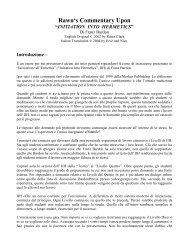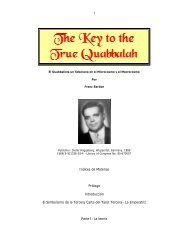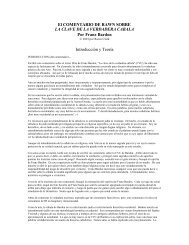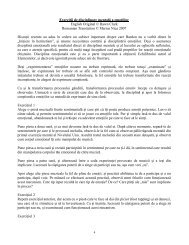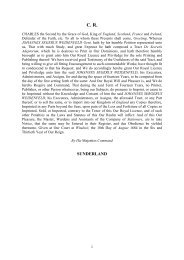Hermetic Philosophy and Alchemy - A Bardon Companion
Hermetic Philosophy and Alchemy - A Bardon Companion
Hermetic Philosophy and Alchemy - A Bardon Companion
You also want an ePaper? Increase the reach of your titles
YUMPU automatically turns print PDFs into web optimized ePapers that Google loves.
Part I<br />
An Exoteric View of the Progress <strong>and</strong> Theory of <strong>Alchemy</strong><br />
Chapter I<br />
A Preliminary Account of the <strong>Hermetic</strong> <strong>Philosophy</strong>, with the more Salient<br />
Points of its Public History<br />
The <strong>Hermetic</strong> tradition opens early with the morning dawn in the eastern world. All pertaining thereto<br />
is romantic <strong>and</strong> mystical. Its monuments, emblems, <strong>and</strong> numerous written records, alike dark <strong>and</strong><br />
enigmatical, form one of the most remarkable episodes in the history of the human mind. A hard task<br />
were it indeed <strong>and</strong> almost infinite to discuss every particular that has been presented by individuals<br />
concerning the art of <strong>Alchemy</strong>; <strong>and</strong> as difficult to fix with certainty the origin of a science which has<br />
been successively attributed to Adam, Noah <strong>and</strong> his son Cham, to Solomon, Zoroaster, <strong>and</strong> the<br />
Egyptian Hermes. Nor, fortunately, does this obscurity concern us much in an inquiry which rather<br />
relates to the means <strong>and</strong> principles of occult science than to the period <strong>and</strong> place of their reputed<br />
discovery. Nothing, perhaps, is less worthy or more calculated to distract the mind from points of real<br />
importance than this very question of temporal origin, which, when we have taken all pains to satisfy<br />
<strong>and</strong> remember, leaves us no wiser in reality than we were before. What signifies it, for instance, that<br />
we attribute letters to Cadmus, or trace oracles to Zoroaster, or the kabalah to Moses, the Eleusian<br />
mysteries to Orpheus, or Freemasonry to Noah; whilst we are profoundly ignorant of the nature <strong>and</strong><br />
true beginning of any one of these things, <strong>and</strong> observe not how truth, being everywhere eternal, does<br />
not there always originate where it is understood?<br />
We do not delay, therefore, to ascertain, even were it possible, whether the <strong>Hermetic</strong> Science was<br />
indeed preserved to mankind on the Syriadic pillars after the flood, or whether Egypt or Palestine may<br />
lay equal claims to the same; or, whether in truth that Smagardine table, whose singular inscription has<br />
been transmitted to this day, is attributable to Hermes or to any other name. It may suffice the present<br />
need to accept the general assertion of its advocates, <strong>and</strong> consider <strong>Alchemy</strong> as an antique arifice<br />
coeval, for aught we know to the contrary, with the universe itself. For although attempts have been<br />
made, as by Herman Conringius (1), to slight it as a recent invention, <strong>and</strong> it is also true that by a<br />
singularly envious fate, nearly all Egyptian record of the art has perished; yet we find the original<br />
evidence contained in the works of A. Kircher (2), the learned Dane Olaus Borrichius (3), <strong>and</strong> Robert<br />
Vallensis in the first volume of the Theatrum Chemicum (4), more than sufficient to balance every<br />
objection of this kind, besides ample collateral probability bequeathed in the best Greek Authors,<br />
historical <strong>and</strong> philosophic.<br />
In order to show that the propositions we may hereafter have occasion to offer are not gratuitous as<br />
also with better effect to introduce a stranger subject, it will be requisite to run through a brief account<br />
of the Alchemical philosophers, with the literature <strong>and</strong> public evidence of their science; the more so,<br />
as no one of the many histories of philosophy compiled or translated into our language advert to it in<br />
such a manner as, considering the powerful <strong>and</strong> widespread influence this branch formerly exercised<br />
on the human mind, it certainly appears to deserve.<br />
This once famous Art, then, has been represented both as giving titles <strong>and</strong> receiving them from its<br />
mother l<strong>and</strong>, Cham; for so, during a long period, according to Plutarch, was Egypt denominated, or<br />
Chemia, on account of the extreme blackness of her soil: --- or, as others say, because it was there that<br />
the art of Vulcan was first practiced by Cham, one of the sons of the Patriarch, from whom they thus




![Magie de YHVH-ADNY et Archeus[1]](https://img.yumpu.com/16926522/1/190x245/magie-de-yhvh-adny-et-archeus1.jpg?quality=85)
